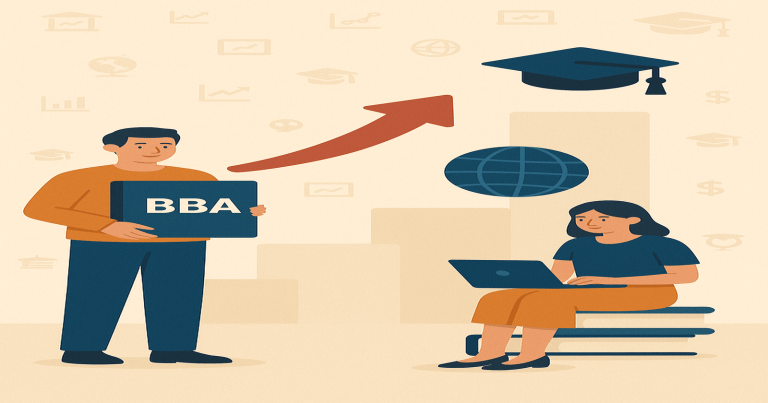Many students wonder what to do after finishing their Bachelor of Business Administration degree. If you have done BBA in Finance, you have many great choices ahead. This means the study options available after you complete your graduation in finance stream. You can go for higher studies, job-ready certifications, or skill courses. All these options help you get better jobs, higher pay, and more knowledge.
Finance is one of the most important sectors today. Every company, big or small, needs people who understand money, accounts, investments, and banking. So, if you take the right course after your BBA in finance, you can make a strong career in finance, banking, stock markets, or even start your own business. Choosing wisely after BBA can change your future.
Why Choose Further Courses After BBA in Finance?
After finishing BBA, some students directly take jobs. But the smart ones go for higher studies. Why? Because further education helps you earn more, learn more, and get better jobs. Courses after BBA in finance make you more skilled and ready for top-level roles.
Today, companies don’t just want graduates. They want people with extra knowledge and special training. A BBA degree gives you a basic idea of finance. But to grow fast in your job, you must learn more. That’s why courses like MBA, CFA, and PGDM are in high demand. These courses focus on special areas like investment banking, risk management, and international finance.
If you study more after your BBA, you can also get jobs in MNCs, government sectors, banks, startups, and global firms. You can also crack entrance exams for government posts or go abroad for higher study. The more you learn, the better choices you get in your career.

Top Degree Courses After BBA in Finance
Degree courses are the most popular option after BBA. These are full-time programs that go deeper into business and finance topics. You can choose one based on your goals and budget.
A degree course usually takes 1 to 2 years. It gives you both theory and real-world training. After completing these courses, you get a certificate from a college or university. These are best for students who want to study in detail and build a strong resume.
| Course Name | Duration | Eligibility | Scope |
| MBA in Finance | 2 Years | Graduation | Jobs in banks, firms, MNCs |
| M.Com in Finance | 2 Years | BBA/B.Com | Teaching, banking, accounting |
| PGDM in Finance | 2 Years | Graduation | Mid to senior-level jobs |
| MMS (Master of Management Studies) | 2 Years | Graduation | Private and government roles |
- The MBA in Finance is the most preferred course for students who want to grow in corporate finance, banking, or the stock market.
- The M.Com in Finance is suitable for students who want to work in teaching, accounting, or research-based fields.
- The PGDM in Finance provides a more industry-oriented approach and helps students get managerial roles in private firms.
- The MMS course covers leadership and team management skills, making students ready for both private and public sector jobs.
Job-Oriented Professional Courses After BBA Finance
If you want a fast-track career path, job-oriented courses are a smart choice. These courses take less time but give high value. They teach skills that companies really want.These courses focus on one field, like risk, tax, or investment. They are often offered by global institutes. You can study them online or part-time. Even working people can join.
- The Chartered Financial Analyst (CFA) course is ideal for those who want to work in investment analysis, equity research, or portfolio management.
- The Certified Financial Planner (CFP) certification is perfect for those who want to become personal finance advisors or retirement planners.
- The CIMA course (Chartered Institute of Management Accountants) is helpful for students who want to work in internal accounting or business analysis.
- The Financial Risk Manager (FRM) course teaches risk identification, valuation, and risk control techniques that are vital for jobs in banking and finance.
- The Certified Public Accountant (CPA) course is widely accepted across the globe and focuses on accounting and auditing standards.
Government and Banking Exams After BBA in Finance
Some students want government jobs after graduation. If you are one of them, then taking coaching for competitive exams is your best course. These are not college courses but job-based exams. They test your reasoning, maths, and general knowledge.
BBA students can apply for many government exams. These include banking jobs, SSC, railways, and even UPSC. You can prepare for them through online classes, books, and test series.
- The IBPS PO and Clerk exams are perfect for students aiming to work in public sector banks in India.
- The SBI PO and Clerk exams offer job opportunities in the largest government bank of India with good pay and growth.
- The RBI Grade B exam is suitable for students who wish to join the Reserve Bank of India in officer-level roles.
- The SEBI Grade A exam is ideal for those who want to work in capital markets and regulatory bodies.
- The NABARD Officer exam helps students get roles in agriculture and rural development finance.
- The SSC CGL exam opens many central government job roles in finance and accounts departments.
- The UPSC Civil Services exam is best for those aiming to serve the nation in administrative services.
Courses for Studying Abroad After BBA in Finance
Some students want to go abroad for higher study. You can do that after BBA too. You can apply for MBA, MSc in Finance, or international certifications in countries like the USA, UK, Canada, and Australia.
You will need good marks, IELTS or TOEFL score, and sometimes GMAT. These courses are expensive but offer global exposure.
- An MBA in Finance from foreign universities is widely recognized and helps students gain international business knowledge.
- A Master’s in Financial Engineering is good for students who love maths, coding, and data-driven finance roles.
- A Master’s in Financial Economics is suitable for students interested in policy-making and market behavior studies.
- A Global MBA with CFA level training is helpful for those who want to mix academic and professional learning for jobs in top MNCs.
Digital Finance and Fintech Courses
The world of finance is going digital. So, many students now choose fintech courses after BBA. These teach you how to use apps, data, AI, and new tech in banking. Courses in digital finance are offered by ed-tech platforms like Coursera, edX, and IIMs.
- Blockchain courses help students understand digital records and cryptocurrency systems.
- Cryptocurrency lessons explain how Bitcoin and other coins work in the digital economy.
- Robo-advisor modules show how automated tools help people invest smartly without human help.
- Digital payment systems like UPI, NEFT, and RTGS train students to handle fast and secure money transfers.
- AI in banking lessons teach how artificial intelligence helps in fraud detection, customer service, and risk analysis.
Freelancing and Entrepreneurial Courses After BBA
If you want to start your own business, take entrepreneurship courses. These teach you how to create a business plan, get funds, and run operations. You can also work as a freelance financial advisor. Many websites offer such work now.
- The Diploma in Financial Entrepreneurship course teaches how to launch, plan, and manage your own finance-based startup.
- The Certificate in Business Startups course helps you build pitch decks, understand funding, and operate with limited capital.
- Freelancing skill-building programs on Upwork and Fiverr guide you to offer accounting, budgeting, or financial advisory services online.
Courses After BBA in Finance FAQs
Q1. What are the best courses after BBA in finance for high-paying jobs?
The best courses after BBA in finance for high-paying jobs include MBA in Finance, Chartered Financial Analyst (CFA), Financial Risk Manager (FRM), and international certifications like CPA or CIMA. These courses help you develop deep financial skills and open opportunities in top MNCs, banks, and investment firms.
Q2. Can I go abroad for higher studies after a BBA in finance?
Yes, you can study abroad after a BBA in finance. You can pursue a Master’s in Finance, MBA, or other specialized courses like MSc in Financial Engineering. You will need to clear IELTS/TOEFL and sometimes GMAT, and also meet university-specific requirements.
Q3. Are there short-term professional courses after BBA in finance?
Yes, there are many short-term professional courses after BBA in finance. Popular ones include CFP, CIMA, financial modeling, digital banking, and fintech courses. These are skill-based and help you get jobs quickly in the private sector or finance startups.
Q4. What government exams can I take after a BBA in finance?
You can apply for various government exams after BBA in finance such as IBPS PO, SBI PO, RBI Grade B, SEBI Grade A, and SSC CGL. These exams can lead to secure and well-paying jobs in public sector banks and regulatory bodies.
Q5. Is MBA in finance better than M.Com after BBA?
MBA in finance is better than M.Com if your goal is to enter the corporate world or multinational companies. It offers broader training in management and leadership, while M.Com is more focused on academic and research-based careers.


